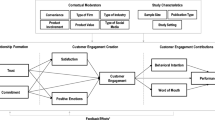Abstract
This paper deals in depth with some of the emotions that play a role in a group recommender system, which recommends sequences of items to a group of users. First, it describes algorithms to model and predict the satisfaction experienced by individuals. Satisfaction is treated as an affective state. In particular, we model the decay of emotion over time and assimilation effects, where the affective state produced by previous items influences the impact on satisfaction of the next item. We compare the algorithms with each other, and investigate the effect of parameter values by comparing the algorithms’ predictions with the results of an earlier empirical study. We discuss the difficulty of evaluating affective models, and present an experiment in a learning domain to show how some empirical evaluation can be done. Secondly, this paper proposes modifications to the algorithms to deal with the effect on an individual’s satisfaction of that of others in the group. In particular, we model emotional contagion and conformity, and consider the impact of different relationship types. Thirdly, this paper explores the issue of privacy (feeling safe, not accidentally disclosing private tastes to others in the group) which is related to the emotion of embarrassment. It investigates the effect on privacy of different group aggregation strategies and proposes to add a virtual member to the group to further improve privacy.
Similar content being viewed by others
References
Alfonseca, E., Carro, R.M., Martín, E., Ortigosa, A., Paredes, P.: The impact of learning styles on student grouping for collaborative learning: a case study. in this issue (2006)
Allan V.L. (1975). Social support for non-conformity. In: Berkowitz L. (eds) Advances in Experimental Social Psychology, vol 8. Academic Press, New York, pp. 1–43
Asch S.E. (1951). Effects of group pressure on the modification and distortion of judgements. In: Guetzkow H. (eds) Groups, Leadership and Men. Carnegie Press, Pittsburgh PA, pp. 177–190
Asch S.E. (1956). Studies of independence and conformity: a minority of one against a unanimous majority. Psychol. Monogr. 70(9):1–70
Aston G., Burnard L. (1998). The BNC Handbook: Exploring the British National Corpus with SARA. Edinburgh University Press, Edinburgh, UK
Aylesworth A.B., MacKenzie S.B. (1998) Context is key: the effect of program-induced mood on thoughts about the ad. J. Advertising 27:17–33
Balota, D.A., Cortese, M.J., Hutchison, K.A., Neely, J.H., Nelson, D., Simpson, G.B., Treiman, R.: The English Lexicon Project: a web-based repository of descriptive and behavioral measures for 40,481 English words and nonwords. http://elexicon.wustl.edu/, Washington University (2002)
Barsade S.G. (2002). The ripple effect: emotional contagion and its influence on group behavior. Admin. Sci. Quart. 47:644–675
Bartel C.A., Saavedra R. (2000). The collective construction of workgroup moods. Admin. Sci. Quart. 45:197–231
Burleson, W., Picard, R.W.: Affective agents: sustaining motivation to learn through failure and a state of stuck. In: Frasson, C., Porayska-Pomsta, K. (eds.) ITS04 Workshop on Social and Emotional Intelligence in Learning Environments, Maceio - Alagoas, Brasil. (2004) Online Proceedings: http://www.cogsci.ed.ac.uk/%7Ekaska/WorkshopSI/
Carofiglio, V., de Rosis, F.: Exploiting uncertainty and incomplete knowledge in deceptive argumentation. International Conference on Computational Science, pp. 1019–1030. San Francisco, CA (2001)
Chin, D.: Addressing problems in the first adaptive system challenge. In: Weibelzahl, S., Paramythis, A., Masthoff, J. (eds.) UM05 Workshop on the Evaluation of Adaptive Systems, pp 74–78.
Edinburgh, UK (2005). Online Proceedings: http://www.easy-hub.org/hub/workshops/um2005/proceedings.html
Deutsch M., Gerard H.B. (1955). A study of normative and informational social influences upon individual judgment. J. Abnor. Soc. Psychol. 51:629–636
Doherty R.W. (1997). The emotional contagion Scale: a measure of individual differences. J. Nonverbal Behav. 21:131–154
Elliot, C., Siegle, G.: Variables influencing the intensity of simulated affective states. AAAI Spring Symposium on Reasoning about Mental States: Formal Theories and Applications, pp. 58–67. Menlo Park, CA (1993)
Fiske A.P. (1992). The four elementary forms of sociality: framework for a unified theory of social relations. Psychol. Rev. 99:689–723
Forster K.I., Forster J.C. (2003). DMDX: A Windows Display Program with millisecond accuracy. Behav. Res. Methods, Instr. Comput. 35:116–124
Gardner M. (1985). Mood states and consumer behavior: a critical review. J. Consumer Res. 12:281–300
González, G., López B., de la Rosa, J.L.L.: Managing emotions in smart user models for recommender systems. In: Sixth International Conference on Enterprise Information Systems, pp. 187–194. Porto, Portugal (2004)
Grath, J.: Émile: marshalling passions in training and education. In: Fourth International Conference on Autonomous Agents, pp. 325–332. Barcelona, Spain (2000)
Gross J.J., Levenson R.W. (1995). Emotion elicitation using films. Cognition Emotion 9:87–108
Harley T. (2001). The Psychology of Language: From Data to Theory. Psychology Press, Hove, UK
Haslam N. (1994). Categories of social relationship. Cognition 53:59–90
Hatfield E., Cacioppo J., Rapson R.L. (1994). Emotional Contagion. Cambridge University Press, New York
Heylen, D., Nijholt, A., op den Akker, R., Vissers, M.: Socially intelligent tutor agents. In: Rist, T., Aylett, R., Ballin, D., Rickel, J. (eds.) The 4th International Working Conference on Intelligent Virtual Agents, pp341–347. Kloster Irsee: Germany, LNAI 2792. Springer Verlag, Berlin (2003)
Introne, J., Alterman, R.: Using shared representations to improve coordination and intent inference, in this issue (2006)
Isbell, L.M., Ottati, V.C., Burns, K.C.: Affect and politics: effects on judgment, processing, and information selection. As accessed on 16 October 2004. http://www.cbrss. harvard.edu/events/ppbw/papers/isbell.pdf (2003)
Isen A.M., Shalker T., Clark M., Karp L. (1978). Affect, accessibility of material in memory and behavior: a cognitive loop?. J. Pers. Soc. Psychol. 36:1–12
Järvenoja H., Järvelä S. (2005). How students describe the sources of their emotional and motivational experiences during the learning process: a qualitative approach. Learn. Instr. 15:465–480
Kay, J., Kummerfeld, R.J., Lauder, P.: Managing private user models and shared personas. In: Cheverst, K., de Carolis, B., Krüger, A. (eds.) UM03 Workshop on User Modelling for Ubiquitous Computing, Johnstown, PA. (2003) Online Proceedings: http://www.di.uniba.it/∼ubium03/apapers.html
Kobsa, A., Cranor, L. (eds.): UM05 workshop on privacy-enhanced personalization. Edinburgh, UK (2005). http://www.isr.uci.edu/pep05/papers/w9-proceedings.pdf
Kobsa A., Schreck J. (2003). Privacy through pseudonymity in user-adaptive systems. ACM Trans. Internet Technol. 3:149–183
Kort, B., Reily, R., Picard, R.: External representation of learning process and domain knowledge: affective state as a determinate of its structure and function. In: Ainsworth, S. et al. (eds.) AI-ED01 Workshop on External Representations in AIED: Multiple Forms and Multiple Roles. San Antonio, TX (2001). Online Proceedings: http://www.psychology.nottingham.ac.uk/research/credit/AIED-ER/contributions.html
Laird J.D., Alibozak T., Davainis D., Deignan K., Fontanella K., Hong J., Levy B., Pacheco C. (1994). Individual differences in the effects of spontaneous mimicry on emotional contagion. Motivation Emotion 18:231–247
Mehrabian A. (1972). Nonverbal Communication. Aldine-Atherton, Chicago, IL
Latané B., Wolf S. (1981). The social impact of majorities and minorities. Psychol. Rev. 88:438–453
Mackie D.M., Worth L.T. (1989). Processing deficits and the mediation of positive affect in persuasion. J. Pers. Soc. Psychol. 57:1–14
Masthoff, J.: Modeling the multiple people that are me. In: Brusilovsky, P., Corbett, A., de Rosis, F. (eds.) User Modeling 2003: 9th International Conference, Johnstown, PA, LNAI 2702. pp. 258–262. Springer Verlag, Berlin (2003)
Masthoff J. (2004a). Group modeling: selecting a sequence of television items to suit a group of viewers. User Model User Model User Adapted Interact. 14:37–85
Masthoff, J.: Selecting news to suit a group of criteria. In: Ardissono, L., Maybury, M. (eds.), AH04 Workshop on Personalization in Future TV: Methods, Technologies and Applications, pp. 252–263. Eindhoven, the Netherlands (2004b). Online Proceedings: http://www.di.unito.it/∼liliana/TV04/schedule.html
Masthoff, J.: The pursuit of satisfaction: affective state in group recommender systems. In: Ardissono, L., Brna, P., Mitrovic, A. (eds.) User Modeling 2005: 10th International Conference, Edinburgh, UK, LNAI 3538, pp. 297–306. Springer Verlag, Berlin (2005)
Mausner B. (1954). Prestige and social interaction The effect of one partner’s success in a relevant task on the interaction of observer pairs. J. Abnormal Soc. Psychol. 49:557–560
McLaren, B.M., Walker, E., Harrer, A., Bollen L., Sewall, J.: Creating cognitive tutors for collaborative learning: steps toward realization. in this issue (2006)
Meloy M. (2000). Mood-driven distortion of product information. J. Consumer Res. 27:345–359
Murry J., Lastovicka J., Singh S. (1992). Feeling and liking responses to television programs: an examination of two explanations for media-context effects. J. Consumer Res. 18:441–451
Oatley K., Jenkins J.M. (1996). Understanding emotions. Blackwell, Malden, MA
O’ Conner, M., Cosley, D., Konstan, J.A., Riedl, J.: PolyLens: a recommender system for groups of users. Seventh European Conference on Computer Supported Collaborative Work, pp 199–218. Bonn, Germany (2001)
Ortony A., Clore G.L., Collins A. (1988). The Cognitive Structure of Emotions. Cambridge University Press, Cambridge, UK
Picard R.W. (1997). Affective Computing. MIT Press, Cambridge, MA
Picard R.W., Papert S., Bender W., Blumberg B., Breazeal C., Cavallo D., Machover T., Resnick M., Roy D., Strohecker C. (2004). Affective learning: a manifesto. BT Technol. J. 22:253–269
Redelmeier D.A., Katz J., Kahneman D. (2003). Memories of colonoscopy: a randomized trial. Pain 104:187–194
Read, T., Barros, B., Bárcena, E., Pancorbo, J.: Coalescing individual and collaborative learning to model user linguistic competences. in this issue (2006)
de Rosis F, Pelachaud C., Poggi I., Carofiglio V., de Carolis B. (2003). From Gretna’s mind to her face: modelling the dynamics of affective status in a conversational embodied agent. Int. J. Human–Computer Stud. 59:81–118
Rottenberg, J., Ray, R.R., Gross, J.J.: Emotion elicitation using films. In: Coan, J.A., Allen, J.J.B. (eds.) The handbook of Emotion Elicitation and Assessment. Oxford University Press, New York (in press). As accessed on 16 October 2004, http://www-psych.stanford.edu/%7Epsyphy/Pdfs/chapter_2_films_final.pdf
Schumann D., Thorson E. (1990). The influence of viewing context on commercial effectiveness: a selection-processing model. Curr. Issues Res Advertising 12:1–24
Schwarz N., Clore G.L. (1996). Feelings and phenomenal experiences. In: Higgins E.T., Kruglanski A. (eds) Social Psychology: Handbook of Basic Principles. The Guilford Press, New York, pp. 433–465
del Soldato, T.: Motivation in tutoring systems. Technical Report CSRP303, School of Cognitive and Computing Sciences, University of Sussex, UK (1994)
Suebnukarn, S., Haddawy, P.: Modeling individual and collaborative problem-solving in medical problem-based learning. in this issue (2006)
Totterdell P., Kellet S., Teuchmann K., Briner R.B. (1998). Evidence of mood linkage in work groups. J. Pers. Soc. Psychol. 74: 1504–1515
de Vicente A. (2003). Towards tutoring systems that detect students’ motivation: an investigation. Ph.D. thesis, School of Informatics, University of Edinburgh, UK
Weiner B. (1995). Judgments of Responsibility: A Foundation for a Theory of Social Conduct. The Guilford Press, New York
Wilson M.D. (1988). The MRC psycholinguistic database: Machine readable dictionary, version 2. Behavi. Res. Methods, Instr. Comput. 20: 6–11
Wilson T.D., Gilbert D.T. (2003). Affective forecasting. Adv. Exp. Soc. Psychol. 35:345–411
Wilson T.D., Gilbert D.T., Centerbar D.B. (2003). Making sense: the causes of emotional evanescence. In: Brocas I., Carrillo J. (eds.) The Psychology of Economic Decisions, vol. 1: Rationality and Well Being. Oxford University Press, New York, pp. 209–233
Wilson, T.D., Klaaren, K.: The role of affective expectations in affective experience. In: Clark, M.S. (ed.) Review of Personality and Social Psychology, vol. 14: Emotion and Social Behaviour, pp. 1–31. Sage, Newbury Park, CA (1992)
Wosnitza M., Volet S. (2005). Origin, direction and impact of emotions in social online learning. Learning Instruction 15:449–464
Zaslow, J.: If TiVo thinks you are gay, here’s how to set it straight. Wall Street J. 26 November (2002)
Author information
Authors and Affiliations
Corresponding author
Rights and permissions
About this article
Cite this article
Masthoff, J., Gatt, A. In pursuit of satisfaction and the prevention of embarrassment: affective state in group recommender systems. User Model User-Adap Inter 16, 281–319 (2006). https://doi.org/10.1007/s11257-006-9008-3
Received:
Accepted:
Published:
Issue Date:
DOI: https://doi.org/10.1007/s11257-006-9008-3




